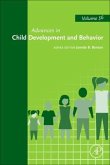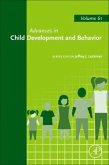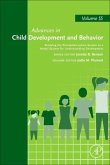New Methods and Approaches for Studying Child Development
Herausgegeben:Lockman, Jeffrey J.; Gilmore, Rick
New Methods and Approaches for Studying Child Development
Herausgegeben:Lockman, Jeffrey J.; Gilmore, Rick
- Gebundenes Buch
- Merkliste
- Auf die Merkliste
- Bewerten Bewerten
- Teilen
- Produkt teilen
- Produkterinnerung
- Produkterinnerung
New Methods and Approaches for Studying Child Development, Volume 62 in the Advances in Child Development and Behavior series, highlights new advances in the field, with this new volume presenting interesting chapters written by an international board of authors.
Andere Kunden interessierten sich auch für
![Handbook of Jealousy Handbook of Jealousy]() S HartHandbook of Jealousy55,99 €
S HartHandbook of Jealousy55,99 €![Advances in Child Development and Behavior Advances in Child Development and Behavior]() Advances in Child Development and Behavior63,99 €
Advances in Child Development and Behavior63,99 €![Child Development at the Intersection of Race and SES Child Development at the Intersection of Race and SES]() Child Development at the Intersection of Race and SES63,99 €
Child Development at the Intersection of Race and SES63,99 €![Global Perspectives on Adolescents and Their Families Global Perspectives on Adolescents and Their Families]() Global Perspectives on Adolescents and Their Families138,99 €
Global Perspectives on Adolescents and Their Families138,99 €![Advances in Child Development and Behavior Advances in Child Development and Behavior]() Advances in Child Development and Behavior76,99 €
Advances in Child Development and Behavior76,99 €![Advances in Child Development and Behavior Advances in Child Development and Behavior]() Advances in Child Development and Behavior63,99 €
Advances in Child Development and Behavior63,99 €![Studying the Perception-Action System as a Model System for Understanding Development Studying the Perception-Action System as a Model System for Understanding Development]() Studying the Perception-Action System as a Model System for Understanding Development63,99 €
Studying the Perception-Action System as a Model System for Understanding Development63,99 €-
-
-
New Methods and Approaches for Studying Child Development, Volume 62 in the Advances in Child Development and Behavior series, highlights new advances in the field, with this new volume presenting interesting chapters written by an international board of authors.
Produktdetails
- Produktdetails
- Advances in Child Development and Behavior Volume 62
- Verlag: Academic Press / Elsevier Science & Technology
- Artikelnr. des Verlages: S0065-2407(22)X0002-5
- Seitenzahl: 308
- Erscheinungstermin: 15. März 2022
- Englisch
- Abmessung: 229mm x 152mm x 19mm
- Gewicht: 630g
- ISBN-13: 9780323915878
- ISBN-10: 0323915876
- Artikelnr.: 63676918
- Herstellerkennzeichnung
- Libri GmbH
- Europaallee 1
- 36244 Bad Hersfeld
- gpsr@libri.de
- Advances in Child Development and Behavior Volume 62
- Verlag: Academic Press / Elsevier Science & Technology
- Artikelnr. des Verlages: S0065-2407(22)X0002-5
- Seitenzahl: 308
- Erscheinungstermin: 15. März 2022
- Englisch
- Abmessung: 229mm x 152mm x 19mm
- Gewicht: 630g
- ISBN-13: 9780323915878
- ISBN-10: 0323915876
- Artikelnr.: 63676918
- Herstellerkennzeichnung
- Libri GmbH
- Europaallee 1
- 36244 Bad Hersfeld
- gpsr@libri.de
Professor Jeffrey J. Lockman got his Ph.D at the University of Minnesota. His research interests center on perception-action and cognitive development. In his recent work, he has been studying the development of tool use in children and how it might be related to the object manipulation skills of infants. Additionally, he has been conducting work on spatial cognition in children, focusing on how children code the location of objects and object features.
Prof. Rick Gilmore works at the Pennsylvania State University in PA, USA.
Prof. Rick Gilmore works at the Pennsylvania State University in PA, USA.
1. Using big data from long-form recordings to study development and optimize societal impact
Margaret Cychosz and Alejandrina Cristia
2. Show your work: Tools for open developmental science
Rick O. Gilmore
3. Beyond screen time: Using head-mounted eye tracking to study natural behavior
John M. Franchak and Chen Yu
4. Online testing in developmental science: A guide to design and implementation
Lorijn Zaadnoordijk and Rhodri Cusack
5. Belief, culture, & development: Insights from studying the development of religious beliefs and behaviors
Rebekah A. Richert, Kara Weisman, Kirsten A. Lesage, Maliki E. Ghossainy, Bolivar Reyes-Jaquez, and Kathleen H. Corriveau
6. Using temporal network methods to reveal the idiographic nature of development
Natasha Chaku and Adriene M. Beltz
7. Computational approaches to understanding interaction and development
D.S. Messinger, L.K. Perry, S.G. Mitsven, Y. Tao, J. Moffitt, R.M. Fasano, S.A. Custode, and C.M. Jerry
8. A model for using developmental science to create effective early intervention programs and technologies to improve children's developmental outcomes
Iryna Babik, Andrea B. Cunha, and Michele A. Lobo
9. Child development in real time: The power of ambulatory assessment for investigating dynamic developmental processes and behavior longitudinally
Diana J. Meter and Samuel E. Ehrenreich
Margaret Cychosz and Alejandrina Cristia
2. Show your work: Tools for open developmental science
Rick O. Gilmore
3. Beyond screen time: Using head-mounted eye tracking to study natural behavior
John M. Franchak and Chen Yu
4. Online testing in developmental science: A guide to design and implementation
Lorijn Zaadnoordijk and Rhodri Cusack
5. Belief, culture, & development: Insights from studying the development of religious beliefs and behaviors
Rebekah A. Richert, Kara Weisman, Kirsten A. Lesage, Maliki E. Ghossainy, Bolivar Reyes-Jaquez, and Kathleen H. Corriveau
6. Using temporal network methods to reveal the idiographic nature of development
Natasha Chaku and Adriene M. Beltz
7. Computational approaches to understanding interaction and development
D.S. Messinger, L.K. Perry, S.G. Mitsven, Y. Tao, J. Moffitt, R.M. Fasano, S.A. Custode, and C.M. Jerry
8. A model for using developmental science to create effective early intervention programs and technologies to improve children's developmental outcomes
Iryna Babik, Andrea B. Cunha, and Michele A. Lobo
9. Child development in real time: The power of ambulatory assessment for investigating dynamic developmental processes and behavior longitudinally
Diana J. Meter and Samuel E. Ehrenreich
1. Using big data from long-form recordings to study development and optimize societal impact
Margaret Cychosz and Alejandrina Cristia
2. Show your work: Tools for open developmental science
Rick O. Gilmore
3. Beyond screen time: Using head-mounted eye tracking to study natural behavior
John M. Franchak and Chen Yu
4. Online testing in developmental science: A guide to design and implementation
Lorijn Zaadnoordijk and Rhodri Cusack
5. Belief, culture, & development: Insights from studying the development of religious beliefs and behaviors
Rebekah A. Richert, Kara Weisman, Kirsten A. Lesage, Maliki E. Ghossainy, Bolivar Reyes-Jaquez, and Kathleen H. Corriveau
6. Using temporal network methods to reveal the idiographic nature of development
Natasha Chaku and Adriene M. Beltz
7. Computational approaches to understanding interaction and development
D.S. Messinger, L.K. Perry, S.G. Mitsven, Y. Tao, J. Moffitt, R.M. Fasano, S.A. Custode, and C.M. Jerry
8. A model for using developmental science to create effective early intervention programs and technologies to improve children's developmental outcomes
Iryna Babik, Andrea B. Cunha, and Michele A. Lobo
9. Child development in real time: The power of ambulatory assessment for investigating dynamic developmental processes and behavior longitudinally
Diana J. Meter and Samuel E. Ehrenreich
Margaret Cychosz and Alejandrina Cristia
2. Show your work: Tools for open developmental science
Rick O. Gilmore
3. Beyond screen time: Using head-mounted eye tracking to study natural behavior
John M. Franchak and Chen Yu
4. Online testing in developmental science: A guide to design and implementation
Lorijn Zaadnoordijk and Rhodri Cusack
5. Belief, culture, & development: Insights from studying the development of religious beliefs and behaviors
Rebekah A. Richert, Kara Weisman, Kirsten A. Lesage, Maliki E. Ghossainy, Bolivar Reyes-Jaquez, and Kathleen H. Corriveau
6. Using temporal network methods to reveal the idiographic nature of development
Natasha Chaku and Adriene M. Beltz
7. Computational approaches to understanding interaction and development
D.S. Messinger, L.K. Perry, S.G. Mitsven, Y. Tao, J. Moffitt, R.M. Fasano, S.A. Custode, and C.M. Jerry
8. A model for using developmental science to create effective early intervention programs and technologies to improve children's developmental outcomes
Iryna Babik, Andrea B. Cunha, and Michele A. Lobo
9. Child development in real time: The power of ambulatory assessment for investigating dynamic developmental processes and behavior longitudinally
Diana J. Meter and Samuel E. Ehrenreich









